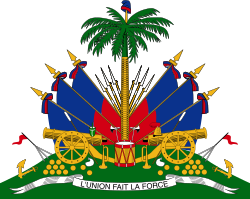 |
|---|
Constitutional Assembly elections were held in Haiti on 19 October 1986. [1] Voters elected 41 of the 61 seats, with the remaining 20 appointed by the National Council of Government (CNG). [2] The CNG claimed that voter turnout was 9.2%, although it was widely reported to be under 5%. [2] [3] A total of 101 candidates contested the 41 seats, [4] which were based on the country's arrondissements. [5]